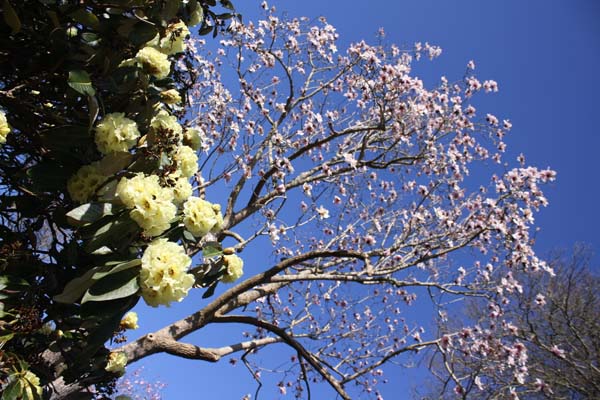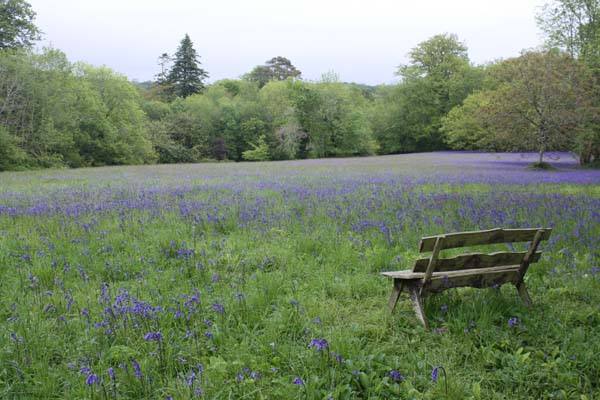26 May 2016
Dig Your Garden
by J.R.Thomas
 This week is the traditional opening of the English summer season, which revs up via Ascot , Wimbledon and Henley to a peak of outdoor sociability in late June, runs down into more informal and private gatherings in July, and ends in mid-July as the exhausted participants depart for their summer holidays. Of course, originally the holidays meant going off to country houses (for those who hadn’t got one, somebody else’s country house – which is what Leo was up to in The Go-Between, a beautiful depiction of summer boredom after the season and before autumn country sports kicked off in September). Finally for the rich and connected, just before the Glorious Twelfth of August there was a decamping to the grouse moors; enormous parties of shootists, their families and staff all crammed into some damp and rarely used highland lodge. Not that this particular culmination of the season is quite dead even now, though probably not even Her Majesty at Balmoral welcomes guests for a month of shooting and fishing nowadays. It is all a long way from the gentle event that ushers all this in, the Chelsea Flower Show.
This week is the traditional opening of the English summer season, which revs up via Ascot , Wimbledon and Henley to a peak of outdoor sociability in late June, runs down into more informal and private gatherings in July, and ends in mid-July as the exhausted participants depart for their summer holidays. Of course, originally the holidays meant going off to country houses (for those who hadn’t got one, somebody else’s country house – which is what Leo was up to in The Go-Between, a beautiful depiction of summer boredom after the season and before autumn country sports kicked off in September). Finally for the rich and connected, just before the Glorious Twelfth of August there was a decamping to the grouse moors; enormous parties of shootists, their families and staff all crammed into some damp and rarely used highland lodge. Not that this particular culmination of the season is quite dead even now, though probably not even Her Majesty at Balmoral welcomes guests for a month of shooting and fishing nowadays. It is all a long way from the gentle event that ushers all this in, the Chelsea Flower Show.

Chelsea runs for a week, a private opening on Monday for the Royal family, one of those events to which they all seem to turn up, though now having to share not with just with the upper echelons of the Royal Horticultural Society, but also with corporate sponsors and their guests, many of whom may well be more interested in summer houses and ride-on lawn mowers (and champagne) than penstemons and meconopsis. On Tuesday and Wednesday the members of the RHS get exclusive possession (with a few more corporate types of course), though as there are close to 500,000 members, “exclusive possession” is perhaps not quite the right expression. And then on Thursday and Friday the general public is finally admitted.
Not so long ago, membership of the Royal Horticultural Society was a badge of exclusivity and pride. Nothing common as “members,” indeed; persons applying to join this august and learned society, with its research centre and demonstration gardens at Wisley in Surrey, the magnificent Lindley Library in Pimlico and its nearby exhibition halls on Vincent Square, became “Fellows” if their application was accepted. To succeed they needed a recommendation from an existing Fellow. Founded from an idea of Josiah Wedgwood in 1804, the RHS saw itself as a centre of excellence, dedicated to keeping up standards in gardening, not a social organisation – or at least, not an open one. The Fellows probably constituted the most splendid social register in the UK, encompassing not only many Dukes and great landed proprietors, but also most of their head gardeners. Its President was always a strong leader and, just as importand, the active owner of a great garden. For many years it was Lord Aberconway, the genius of Bodnant, a magnificent garden in North Wales, who presided almost as a benign dictator, and then Robin Herbert, merchant banker, landowner, and great gardener and forester at Llanover in Monmouthshire.

Times have changed. The RHS had something of a financial crisis in the late 1970’s, mainly because of inflation and some big repair bills at Vincent Square and for the Library, and decided that it needed to let the public in. Fellows became Members (much grumbling there) unless they paid a tidy capital donation (more grumbling). Membership was expanded, one of the exhibition halls sold, the magazine commercialised. From being slightly snooty and academic in a horticultural way, the RHS began to embrace the lead of the National Trust and went for mass membership and a mission statement.
In recent years it has become more and more populist, seeking to reach out to the great British public. Wisley remains its heart, but it has taken on several more exhibition gardens which exemplify gardening techniques and also attract large numbers of the paying public. The first was Rosemoor in Devon, given by Lady Anne Palmer, daughter of a last Earl, a very romantic and personalised garden (you might not say that about it now, but it is a huge tourist attraction and magnificent in its own way, a centre of horticultural excellence for the West Country). The latest garden to be taken on, the fifth, is Worsley New Hall, just outside Salford, Lancashire, in an association with Peel Group, a major property developer who will build an hotel at its heart. It is a long ruined garden and park which will be reconstructed to teach more about urban gardening and provide a horticultural centre for the north-west. The style and source of those two gardens demonstrates how the RHS has evolved.
Some things have not changed. The RHS has retained the tradition of having a great landowner/garden owner as President – currently Sir Nicolas Bacon, 14th Bart, owner of a great garden in Norfolk and Premier baronet of England. It also has retained another tradition. It awards medals and honours for great plants and to great plantsmen and women. Standards there have not diminished and for a gardener to be awarded the VMH, the Victoria Medal of Honour, is a mark of true distinction, and one which its recipients feel more worthy than almost any other. (We are reminded of the pride with which foxhunters bear the designation of Master of Fox Hounds; any person, and there are several, who are both MFH and VMH must really struggle as to which is to be given precedence.)
As with the National Trust there is an uneasy tension between the traditionalists and the modernisers. In the National Trust the modernisers have pretty much won, and the Trust with its four million plus members is now as hip and cool and corporately modelled and politically correct as can be. But the horticultural old guard have not buckled so quickly. The RHS is still the guardian of gardening standards, the giver of awards, the sponsor and assessor of research, the publisher of serious and learned works and the prime mover of standards in horticultural education; fundamentally an organisation for serious and dedicated gardeners, not just for those who like gardening by way of a stroll around other people’s property.
Which is not to say that popularism is not creeping in. The RHS has long had a thing about householders concreting over their front gardens to park their cars. This is seen as a problem in suburbia rather than in deepest rural gardening England, let alone a problem of too much gravel in front of Jacobean mansions. Its latest bit of research, issued to coincide with the Chelsea Flower Show, is a piece of popularism, promoted by Sue Briggs the RHS Director-General and supported by the ubiquitous Alan Titchmarsh, TV gardener extraordinaire. It expresses concern that not enough young people are interested in gardening and blames the disappearance of front gardens for this decline. It is rather sweet and rather RHS that it believes that front gardens full of cottage plants or standard roses would inspire young people to start growing daffodils in tubs and cultivating allotments. The truth is probably what it always has been; gardening begins when the householder has settled comfortably in a place of their own and the garden offers a refuge from screaming children and household routines.
Gardening is undoubtedly one of Britain’s great gifts to the world and we have for centuries led the world in all manifestations of horticulture. The role of the Royal Horticultural Society in that has been vital, and so far it has managed the delicate balance between adherence to serious and worthy objectives and widespread popular appeal and mass financing, a sight more successfully than many of the other large conservation charities. Long may it continue to flower.
If you enjoyed this article please share it using the buttons above
Please click here if you would like a weekly email on publication of the Shaw Sheet

